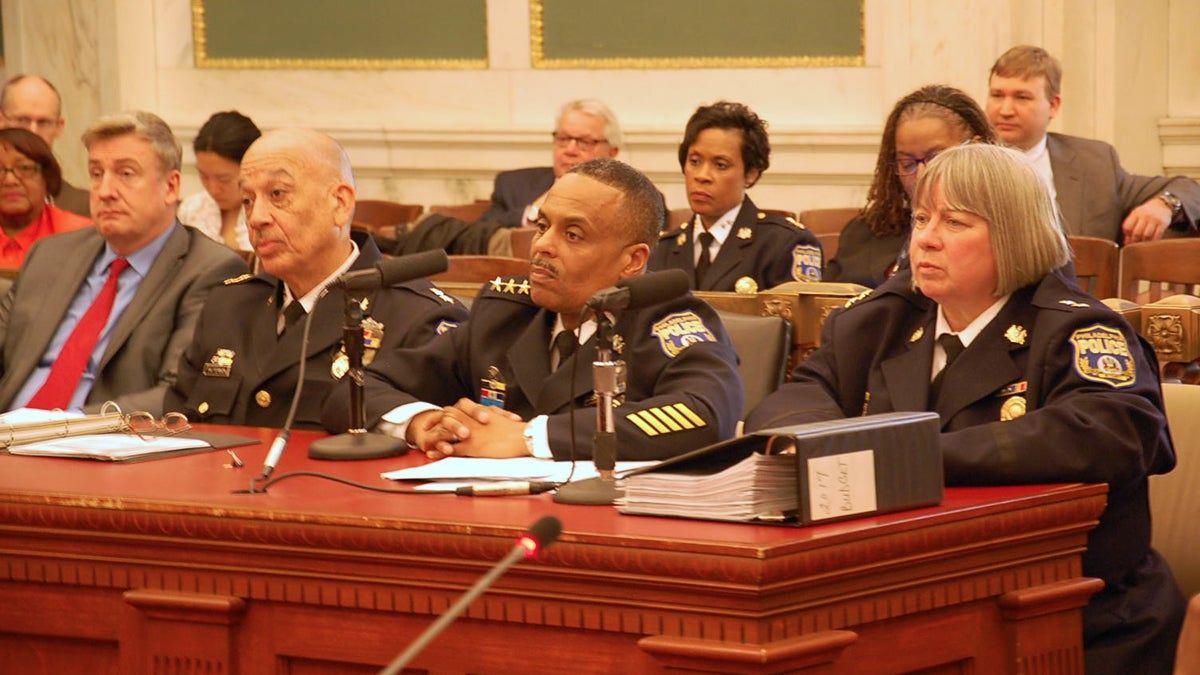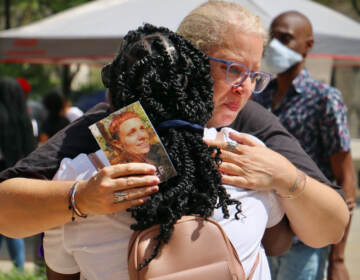Philly police recruits may soon no longer need college credits

Philadelphia Police Commissioner Richard Ross is joined by Myron Patterson
The Philadelphia Police Department’s staffing shortage has become severe, reaching a two-decade low, in part because officials say they’ve struggled to recruit new officers.
In an effort to reverse recent hiring declines, the department has proposed ending the requirement that new officers have 60 college credits, Police Commissioner Richard Ross told members of City Council at a Wednesday budget hearing.
“I can’t tell you how many times I got people who stop me and my staff who say, ‘I want to be a police officer, but I don’t have 60 credits,'” Ross said.
The college credit stipulation was a policy of former Police Commissioner Charles Ramsey, who originally said the standard was good for the department but later cited it as an impediment to diversifying the ranks.
Police departments in New York City, Chicago and elsewhere mandate that new hires have two years of college, which usually adds up to 60 credits.
Ross also said he’s asking the city’s civil service commission, which handles city hiring rules, to bump up the minimum age of a new officer from 19 to 22 in lieu of the college credit stipulation.
“Most people who graduate at 17 or 18 are doing something between that age, which means maybe you have some life experiences, maybe your thinking is a little different,” Ross said. “Not everybody at 19 may be prepared for this … 22 would be a solid age.”
In addition to the 60-credit requirement, candidates for the Philadelphia force must pass a background check, undergo a drug screening and pass polygraph and psychological tests.
Another factor in the staffing shortage, Ross pointed out, was how many police officers took advantage of the Deferred Retirement Option Plan, or DROP, allowing them to pick a retirement date four years in the future. Many officers, he said, mistakenly thought changes made to the program meant that it would soon no longer be available.
“We had a mass exodus about a year or two ago. That undoubtedly had an impact. People who thought the DROP was not going to be extended,” Ross said. “And so, there were people who got into DROP who were not ready to leave.”
Among full-time employees, the department is 55 percent white; 34 percent African-American; and about 8 percent Hispanic. Asians account for nearly 2 percent of personnel. The median salary for all groups is about $66,000 a year.
The city of Philadelphia is nearly half white, 44 percent African-American and about 14 percent Hispanic, with Asians accounting for some 7 percent.
Ross said basic staffing demands must be met before the department can deal with further diversifying.
“My first step is to get police officers,” he said. “You’re not worried about what they look if you have an emergency.”
The department is asking the city to fund 6,525 sworn police officers, what Ross says would be optimal staffing. The force currently stands at a little more than 6,100 officers.
The decision to drop the college credit rule wasn’t made lightly, Ross said, but he needs to fill hundreds of positions to meet the department’s basic needs.
“Look, I have my reservations about going backwards on a educational requirement, but my first concern is the safety of people who live and visit and work in this city, and we have to take care of that first,” he said.
A spokesman for Mayor Jim Kenney confirmed the mayor backs Ross’ proposal. The city’s police union has not resisted the move, either.
“We’re having a significant problem,” Ross said. “I’ve got to do something.”
WHYY is your source for fact-based, in-depth journalism and information. As a nonprofit organization, we rely on financial support from readers like you. Please give today.




